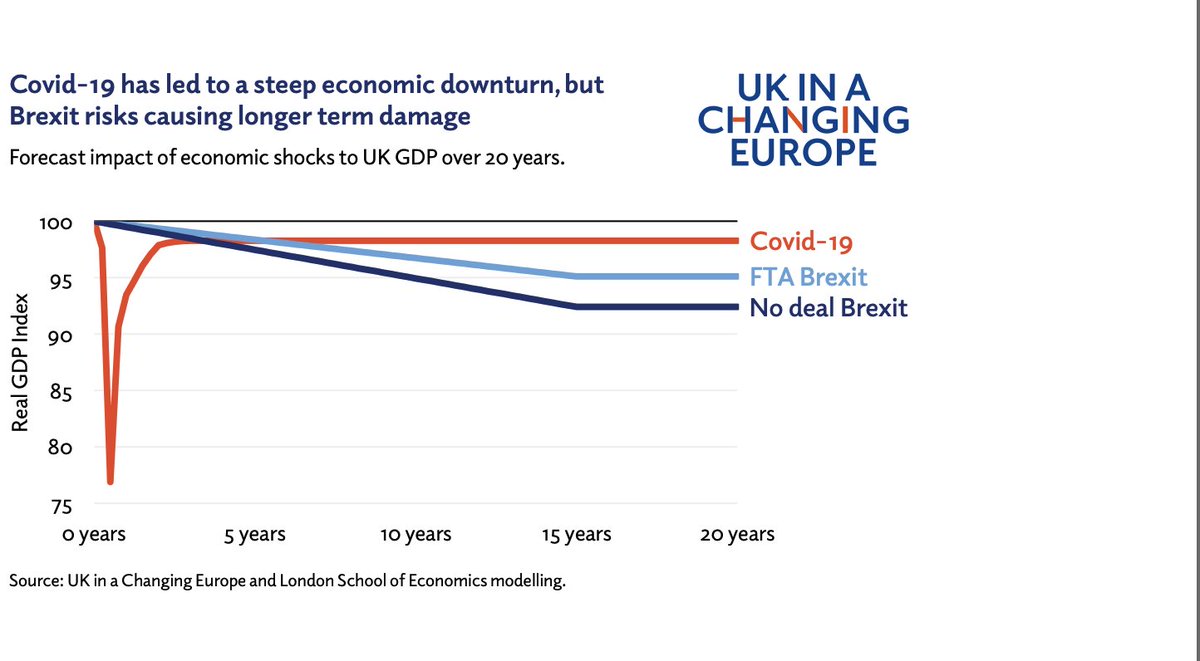Yesterday we released a NEW report #WhatWouldNoDealMean.
And, you've guessed it, this report is the subject of today's #ThursdayThread. 🧵
ukandeu.ac.uk/wp-content/upl…
And, you've guessed it, this report is the subject of today's #ThursdayThread. 🧵
ukandeu.ac.uk/wp-content/upl…

.@BorisJohnson has said that no deal with the EU would be a “good outcome” for the UK.
This report highlights what it would mean in terms of trade, fisheries, connectivity, the impact on citizens, Northern Ireland, economics, security, foreign policy, politics and more.
This report highlights what it would mean in terms of trade, fisheries, connectivity, the impact on citizens, Northern Ireland, economics, security, foreign policy, politics and more.
On #trade, the two sides would revert to #WTO rules.
We’re talking tariffs, customs checks, and regulatory checks. In other words, increased hassle, increased time and increased costs for businesses trading with the EU.
@CSBarnard24 explains.
We’re talking tariffs, customs checks, and regulatory checks. In other words, increased hassle, increased time and increased costs for businesses trading with the EU.
@CSBarnard24 explains.
On #fisheries, the UK would regain full control over its waters, but UK fishers would find it harder to sell their fish in the EU. 🐠
On #energy, trade will continue tariff-free but the UK will be outside the EU internal energy market, impacting security of supply and prices.
On #data, without an adequacy agreement, flows of data to the UK would require extra safeguards.
On #data, without an adequacy agreement, flows of data to the UK would require extra safeguards.
On #roads, changes to permits, regulations and border controls mean haulage will face huge challenges, with effects across the economy. 🚚
On #aviation, basic connectivity may continue through unilateral mitigations on both sides, but this will introduce huge uncertainty. ✈️
On #aviation, basic connectivity may continue through unilateral mitigations on both sides, but this will introduce huge uncertainty. ✈️
For citizens, travelling to the EU, working in the EU, driving to the EU, having health insurance in the EU or taking your pet to the EU will all require more form filling than now. 🚙 🐶 🐈
On #NorthernIreland, although the Withdrawal Agreement dealt with many issues, no deal would have major impacts on GB-NI trade in particular.
No deal would mean no bilateral means to ease trade flows and minimise checks on goods entering NI from GB.
No deal would mean no bilateral means to ease trade flows and minimise checks on goods entering NI from GB.
On the #economics, no deal would be a further major shock to the UK economy.
While Covid would have a greater short-term impact, over the longer term the impact of no deal would 2 to 3 times bigger.
@thom_sampson
While Covid would have a greater short-term impact, over the longer term the impact of no deal would 2 to 3 times bigger.
@thom_sampson

On #security, the UK would fall back on much less effective international instruments, like Interpol and older international treaties.
The UK would lose access to EU databases that provide vital info for tackling crime and many tools UK law enforcement have come to rely on.
The UK would lose access to EU databases that provide vital info for tackling crime and many tools UK law enforcement have come to rely on.
And then there’s the diplomatic fallout. If the talks collapse, each side will blame the other. There will be a lot of finger pointing.
Sitting down to resume talks will not be easy, nor will cooperation on a host of other issues.
Sitting down to resume talks will not be easy, nor will cooperation on a host of other issues.
So while it is true that the gap between the thin deal the PM wants and no deal is small, there is still a huge difference.
A deal at least prevents a falling out and means we can keep talking and collaborating.
@anandMenon1 explains.
A deal at least prevents a falling out and means we can keep talking and collaborating.
@anandMenon1 explains.
• • •
Missing some Tweet in this thread? You can try to
force a refresh






